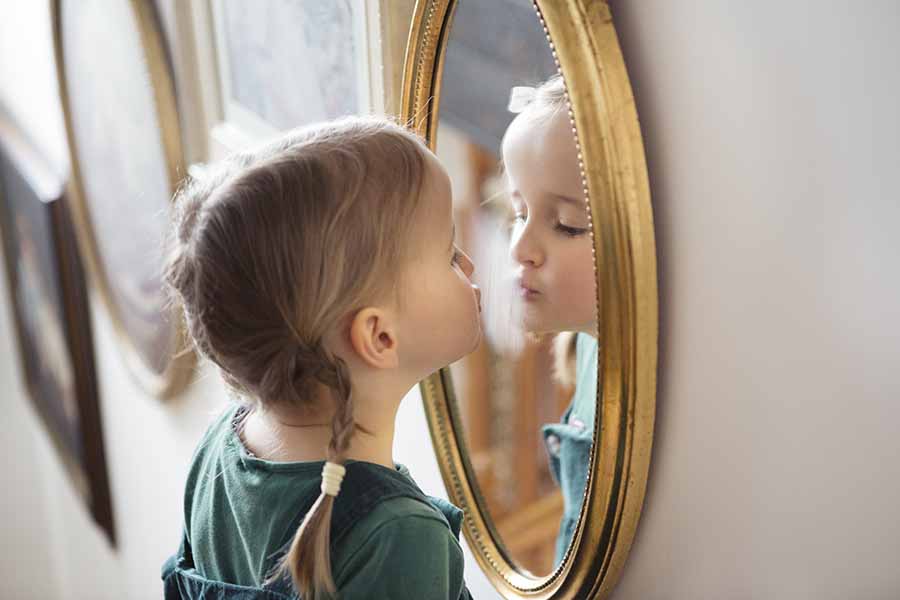
Photos in this post are for illustrative purposes only.
We have all done this: a friend shows us a photo of her child and our initial response is to praise the child’s looks (“She’s so cute!”). Americans are obsessed with beauty. That obsession breeds narcissism.
What is Narcissism?
Narcissism is a mental disorder characterized by an egotistical preoccupation with oneself. The narcissist prioritizes her own needs and personal preferences above others.
A small amount of narcissism is healthy. But a malignant narcissist is totally absorbed in herself.
Parents raise narcissists by obsessing over their child’s looks and achievements.

The narcissist lives vicariously through her child. She lavishes the child with gifts and praise, but she doesn’t teach the child responsibility or self-worth.
The narcissist suffered a major attachment trauma in her childhood. Her mother may have been a celebrity or airline stewardess who traveled extensively. The narcissistic child viewed her mother’s absences as abandonment.
The narcissist remains emotionally stuck at that age when the psychological trauma of her separation anxiety occurred.
As a result of her emotional trauma, she retreats inside herself and builds a barrier to guard herself from further injury. She convinces herself that people can’t be trusted because they will leave her.
The protective barrier becomes her new sense of self; a false identity that she presents to the world to mask her insecurities.
Her false identity may be attractive, self-assured and confident on the outside, but look a little deeper and you will see a bitter, hurt individual. She only cares about herself. People are objects to be used and abused. She is the center of her own universe.

Because she has a false sense of identity she is constantly checking herself in a mirror or taking hundreds of Selfies a day. She has many mirrors and photos of herself on the walls of her home.
Some narcissists hire a professional photographer to take photos or shoot videos for their social media pages. Their image is everything to them.

Studies show that we are living in an increasingly narcissistic society. The sharp rise in narcissism in today’s society is directly linked to social media.
Recent studies show that Gen-Zers and millennials are more likely to value money, image and fame over community, affiliation and self-acceptance.

Instagram is a narcissist’s playground where self-obsessed users upload photos or videos of themselves or their children for ‘likes’ to validate their feelings of self-importance.
In a blog on Huffingtonpost.com, sports psychology consultant Nicole Forester referred to social media as an “Epidemic of narcissism”.
“We are each hard-wired with the desire to feel relevant. Everyone wants to feel like they matter and are important. Social media provides this outlet, but also promotes being self-absorbed,” she writes.
Signs & Symptoms of Narcissism
- Difficulty maintaining longterm relationships
- Feeling of entitlement
- Lack empathy for others
- Exaggerates her talents and achievements
- Easily bored
- Constantly looking at her reflection in a mirror
- Obsessed with taking Selfies
- Sensitive to criticism
- Taking advantage of others
- Verbally or mentally abuses others
- Exaggerates her own importance
- Unrealistic fantasies of love with public figures (Erotomania)
- Seeks relationships with celebrities, athletes, or VIPs
- Craves constant attention from others
- Has frequent episodes of narcissistic rage
- Jealous of other people’s success
- Suffers from depression or anxiety
- Avoids situations that may result in failure

Children are concrete in their thinking. Children typically have a difficult time distinguishing between their actual self (who they actually are) and their ideal self (who they think they are).
This causes an unrealistic view of themselves. Children who grow up to be narcissists have fractured personalities (unrealistic perception of actual self and ideal self). They are like broken mirrors. We can put the pieces back together but the mirror will never be whole.

To develop a realistic self-view, a child must receive approval from her environment in balanced and healthy doses.
She must be taught to accept responsibility for her own behavior.
All babies are born narcissistic. But through social interaction with other children (such as in day care or kindergarten), they learn that the world does not revolve around them.
The following factors can lead to narcissism:
- Unpredictable or unreliable caregiving from parents
- Parents who work many hours or travel frequently
- Excessive admiration of a child that is never balanced with realistic feedback
- Excessive praise for good behaviors or excessive criticism for bad behavior.
- Excessive praise for beauty or talent
- Emotional or physical abuse in childhood
- Valued by parents as a means to regulate their own self-esteem
- Living vicariously through your children
Treatment
It is unusual for narcissists to seek treatment. They will seek therapy if they’ve suffered a narcissistic injury (loss of a relationship or employment) that leaves them feeling helpless.
Treatment can be very difficult because narcissists think they know more than doctors.
Treatment can include therapeutic approaches (anger management, cognitive, behavioral etc. Medication is also prescribed for depression, anxiety, etc.
Psychologists urge parents to stop praising your child’s looks and limit the child’s access to social media.
Always tell your children you love them. Set boundaries with your children. You are the authority figure in your household. You are not their friend.
This has been your Medical Minute.
DISCLAIMER
Any medical information published on this blog is for your general information only and is not intended as a substitute for informed medical advice. You should not take any action before consulting with your personal physician or a health care provider. Sandrarose.com and its affiliates cannot be held liable for any damages incurred by following information found on this blog.





